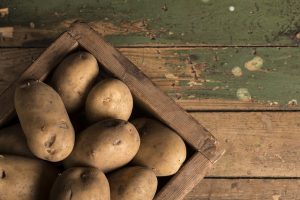
What is the potato diet? Does the potato diet work? Is it healthy? In this total guide to the potato diet or the potato hack, we’ll go over what this diet is, why it’s become so notable recently, and the potato diet results you can expect. We’ll also discuss if the potato diet is healthy, if you should do it, and how to make it go smoothly if you do decide to potato diet. Finally, we’ll provide some potato hack recipes.
What Is the Potato Diet?
There are several types of potato diets, but they all involve eating cooked potatoes and very little else for a certain amount of time. So the “potato diet” (or “potato hack”) is basically what it sounds like—a diet of potatoes!
However, not everyone does the potato diet the same way. Because of all the variations out there, there are two major questions you need to ask about any particular potato diet: how long you do the potato diet and exactly what you can eat on the potato diet.
How Long Is the Potato Diet?
You can do a potato diet for any length of time, but in general, there are two potato diet “camps”: the short-term potato diet (or the “potato hack”), and the long-term potato diet.
- Short term potato diet/potato hack: For short-term weight loss of a few pounds, many people do the “potato hack,” and only eat potatoes for a short amount of time. The typical length of time is 2-3 days, but some people go up to a week. The idea behind the “potato hack” is that by completing one every once in awhile, you can maintain a particular weight without long-term super-restrictive dieting. Potato hacking was pioneered by Tim Steele, who claims to have based the potato hack on an 1849 diet plan for “dyspeptics.”
- Long-term potato diet: For major weight loss over a long period of time, some people will do a potato diet for multiple months at a time. This is what notable Australian potato dieter Andrew Taylor did—he went an entire year eating only potatoes, plus a few seasonings.
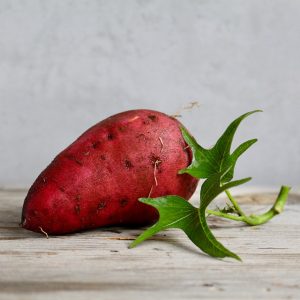
The potato says, "look deep into my eyes..."
What Can I Eat on the Potato Diet?
Sadly, potato chips, french fries, mashed potatoes with lots of cream and butter, and other high-fat, high-salt potato foods are not allowed on any potato diets. Other than that, there’s a surprising amount of variation in potato diet plans. This variation tends to have three types:
- First, there’s variation in what kinds of potatoes you can eat. In some potato diets, you eat nothing but cooked white potatoes. Some allow you to eat the skin, and some have you peel the potatoes. (Note that the potato skin does have lots of nutrients and fiber). Some potato diets allow you to eat any variety of cooked potato: white, russet, gold, new, fingerling, blue, red, and so on and so forth. There are even potato diet plans that allow you to include sweet potatoes and yams. In fact, some variations have you consume an all-sweet potato diet!
- Second, there’s variation in what oils and seasonings are allowed. Some potato diets hold to a strict no-seasonings and no oils rule—just plain potatoes. There are potato diets that allow small amounts of low-calorie seasonings (like spices and hot sauces) but no oils or other add-ins. Some potato diets let you use small amounts of healthy oils (like olive oil) and non-dairy milks (for mashed potatoes). Just so long as you aren’t adding lots of high-calorie and/or high-fat ingredients to your potatoes (like heaping your baked potato with cheese and sour cream), the granular particulars of the seasonings you consume on your potato diet probably don’t make a huge difference in the outcome.
- Third, there’s variation in how you are allowed to cook the potatoes. Super-strict potato diets may allow you to eat only boiled potatoes, or put you on a 100% baked potato diet! Others allow you some flexibility to bake, roast, saute, or boil potatoes as you please, just so long as you meet the other guidelines about oils and seasonings.
Note that there are usually beverage restrictions on a potato diet, too. Water, coffee, and tea (without milk or sugar) are the most commonly allowed beverages. You won’t be doing much good if you’re eating only potatoes but drinking a gallon of Coke every day!
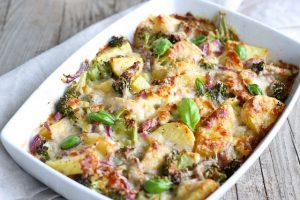
No potato casserole for you on this diet!
Who’s Doing the Potato Diet?
The potato diet movement has circulated in Paleo diet circles, with many Paleo bloggers giving rave potato diet reviews. This is actually a departure from the typical Paleo focus on lots of meat.
There have also been some high-profile potato dieters in recent years. Here’s a rundown of the biggest figures in the potato diet world:
- Australian man Andrew Taylor ate only potatoes for a year. In the first month of his all-potato diet, he lost 22 pounds; over the course of the year, he went from weighing 334.4 pounds (151.7 kg) to 218 pounds (99 kg). He says that he began the diet as a way to combat his out-of-control food addiction. According to Taylor, he got 99% of his calories from potatoes (including sweet potatoes) and only 1% from seasonings and spices (and, apparently, the occasional beer). He’s since written a book called DIY Spud Fit to help other prospective long-term potato dieters.
- None other than magician Penn Jillette (of Penn & Teller fame) kick-started a year-long, 100-pound weight loss regime by eating nothing but five skinless potatoes a day for two weeks. He lost 18 pounds during that two-week period. Afterwards, he transitioned to a “nutritarian diet” and lost 100 pounds over the course of a year. He, too, has written a book about his weight-loss experience, called Presto! How I Made 100 Pounds Disappear and Other Magical Tales.
- Chris Voigt, the Potato Commissioner of Washington State, spent 60 days eating 20 potatoes a day to try to prove that potatoes are healthier than people give them credit for. He included some oil, salt, and seasonings. While he wasn’t trying to lose weight, he did lose 21 pounds and saw some other nutritional benefits.
- Tim Steele, creator of the potato hack, is another notable potato diet figure. He believes that potato hacking helps the gut microbiome to become more diverse and that this helps digestion. He has an entire blog and a self-published book dedicated to potato hacking.

Mr. Squiggles is also considering the potato diet.
Does the Potato Diet Work?
Can eating potatoes and nothing but potatoes really lead to weight loss? What are the potato diet results you can expect? After all, potatoes are very starchy and typically avoided by dieters.
Surprisingly, it seems like the potato diet can lead to weight loss. You probably noticed that most of the potato diet proponents mentioned above experienced some fairly dramatic potato diet results:
- Andrew Taylor lost over 100 pounds in 12 months.
- Penn Teller lost 18 pounds in two weeks.
- Chris Voigt lost 21 pounds in two months.
It is clearly possible, then, to lose weight on the potato diet. But why does the potato diet make you lose weight?
Weight loss is caused by a caloric deficit—basically, you use more food energy than you take in.
For most potato dieters, the diet isn’t about consciously limiting calories. You are supposed to eat (potatoes, of course) whenever you get hungry, and eat until you are full. However, you may go into a caloric deficit (and thus lose weight) on the potato diet for two major reasons:
- Potatoes keep you full: The potato has an unusually high satiety index. This means that people feel fuller for longer after eating potatoes than almost any other food. If you feel fuller, you won’t need to eat as often. This means you’ll probably eat fewer calories. Fewer calories means you are more likely to go into caloric deficit and use more energy than you are taking in.
- You’ll get bored of potatoes: Eventually, you will get bored of potatoes, which will also cause you to eat less in quantity and less frequently. You won’t be stuffing yourself with extra bites when you are already stuffed because you’ll be tired of eating potatoes. And you won’t necessarily want to do a whole lot of snacking when your only option is a potato.
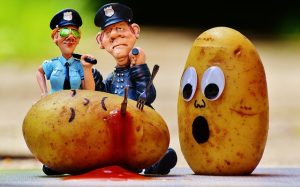
You may want to commit unspeakable crimes against potatoes by the time you're done potato hacking.
Is the Potato Diet Healthy?
Of course, just because the potato diet results in weight loss doesn’t mean that the potato diet is actually good for you. While there may be some short-term health benefits to the potato diet, in the long-term, it’s not good for you.
Why the Short-Term Potato Diet Could Be Healthy
There are a few reasons why a short-term potato diet may have some health benefits:
Potatoes Are Pretty Good for You
If you’ve dieted before, you may have been told that white potatoes are “bad” for you. This is not actually true.
Lots of what is bad about eating a lot of potatoes does not have anything to do with the potatoes themselves. What do I mean by this? Well, think about the most common potato dishes: potato chips, french fries, mashed potatoes loaded with cream and butter, potato skins, twice-baked potatoes, potato gratins, and so on. These are often fried and full of bad fats and salt, with ingredients like heavy cream, bacon bits, and gobs of cheese. It’s not the potatoes that are the problem here!
People say that potatoes have a high glycemic index, but it actually varies depending on the type of potato and how it is cooked. Additionally, glycemic index doesn’t tell the whole nutritional story.
Potatoes may be starchier than your average vegetable, but they are still a vegetable, and are packed with valuable nutrients. Just so long as you don’t plan on subsisting only on potatoes for your entire life, eating potatoes for a few days can actually be quite healthy.
If you’re doing a sweet potato diet, sweet potatoes have a similar macronutrient profile as regular potatoes (With 7.7% of calories coming from protein, 91.7% from carbs, and only .6% from fat). However, they have more sugars and less starch, and a different spread of micronutrients (including huge quantities of Vitamin A).

It turns out potatoes are lot healthier when you don't fry them in oil or slather them in butter, cream, and cheese. Who knew?
You Aren’t Eating Unhealthy Fats and Sugars
In addition to being surprisingly nutritious on their own, eating nothing but potatoes has another benefit: if you’re eating only potatoes, you aren’t eating all of the unhealthy sugars and fats you would normally eat.
The typical American diet is very unhealthy. Even people who are trying to eat right are often surprised to find how many of their foods contain added sugars.
So, by doing the potato diet, you are naturally cutting out lots of unhealthy foods you might normally consume. Of course, the potato diet is far from the only way to do this, but it is a health benefit.
You can see the impact of this in Chris Voigt’s two-month potato diet: his bad cholesterol, blood glucose, and triglyceride levels all went down. This was likely due to a combination of potatoes’ heart-disease fighting qualities and the lack of intake of unhealthy fats and sugars during this time.
You Can Change Your Relationship to Food
Even a short-run potato diet can help you adjust your relationship to food. It can help you realize things like how often you eat when you’re bored or tired and how often you crave particular unhealthy foods. If you can push through the first couple days, you will likely find that your cravings decrease and you have a better sense of when you are hungry and when you are full.
Another potential benefit of a short-term potato diet is that it can help you transition to a healthier diet afterwards. After eating nothing but potatoes for several days, pretty much any other foods will feel like a luxurious treat. So it’s a good chance to try to start some healthy habits after the potato hack. (Don’t be too restrictive—more on that below. But consider implementing some smaller changes like preparing healthier breakfasts without added sugars, eating fruits and veggies for snacks, and cutting down on sugary beverages.)

Look at all the sweet, beautiful vegetables you can eat when you're done with your potato hack.
Why the Potato Diet Is Unhealthy in the Long Run
While potato hacking occasionally may have some health benefits, in the long run, the potato diet is not very good for you. Nutritionists’ potato diet reviews are not good. Here's why:
Essential Nutrient Deficits
While potatoes are much healthier than people typically believe they are, no one food can provide all of the essential nutrients you need for life indefinitely. Any mono diet (a diet where you consume only one thing) leads to long-term nutritional deficits. If you consume only potatoes, about 92% of your calories will come from carbs, 1% from fats, and 7% from protein. That’s not enough fat or protein. Fat is essential for brain function, and protein is essential for muscle function, the immune system, hair and nail strength, and bone health.
You will also end up with micronutrient deficiencies. Micronutrients (like vitamins and minerals) play a key role in lots of our body functions, including immune function. Nutritionist Alyosa Hourigan pointed to the lack of bio-available iron in potatoes as a major issue with Andrew Taylor’s year of spuds. And iron deficiency leads to anemia.
If you’re doing a sweet potato diet, note that long-term, you may end up with excess Vitamin A.
Lost Muscle Mass
Remember how we just said protein is essential for muscle function? Without enough protein, your muscles will start wasting. So you’ll keep losing weight, but you’ll be losing muscle mass, not fat. And the problem with this is that losing muscle mass lowers your metabolism. And a lower metabolism means weight loss becomes even harder to maintain. When you do lose weight, it’s important that you try to preserve as much muscle as possible. This helps your weight loss be more healthy and sustainable.
Disordered Eating Patterns
A short-term potato diet can act as a useful “reset” to some of your unhealthy eating habits. However, long-term potato dieting is so restrictive that it becomes its own kind of unhealthy eating habit!
Eating only one food (like potatoes) or food group (like fruits) long-term is called a mono diet or monotrophic diet and is a recent fad in the dieting world. One major figure in the mono-diet world is Freelee the Banana girl, who regularly eats over 30 bananas a day. But this sort of mono dieting long-term can promote an unhealthy relationship with food, because it doesn’t actually build healthy eating habits—it just removes the element of choice completely from the equation, instead of helping you learn how to create healthy meals and snacks.
Overall, it’s much better to address your underlying issues with your relationship with food instead of transitioning to another disordered eating pattern, even if it’s nominally “healthier” and causing weight loss.

You're doing the potato diet for six months? But why?
Should You Do the Potato Diet?
Based on the available evidence of its long-term nutritional harms, I can’t recommend doing a long-term potato diet. Even if you are able to lose lots of weight on this diet, the truth is that in the long run, most restrictive diets do not work. People usually regain the lost weight. While Penn Jillette and Andrew Taylor had some pretty dramatic potato diet before and after stories, it’s too early to see if their major weight losses will last.
For long-term healthy weight loss, you need to make gradual, sustainable changes to your food habits and physical activities. This doesn’t mean that you can’t use a short “potato hack” to help kick cravings and start out a new food regimen. You just have to remember that you will have to maintain sustained changes in your food choices once the potato diet is over. If you don’t plan carefully and create a long-term diet that you can live with, you run the risk of returning to unhealthy eating habits as soon as the potato diet is over and just regaining all the weight.
Another reason to do a short potato hack is to lose a little weight quickly for a big event. This is fine just so long as you realize that you almost certainly will not keep the weight off if you don’t make other lifestyle changes.

The potato diet: little-known red carpet preparation secret?
Potato Diet Plans: How to Make a Potato Diet Work
If you’ve decided to try potato hacking, how can you make the process go smoothly? Here are three tips to help you make a potato or sweet potato diet plan:
Note: If you are worried about your eating habits, I suggest that you speak with a nutritionist instead of attempting a long-term potato diet. However, most of these tips for short-term potato hacking would also apply to a long-term potato diet.
Choose an Optimal Time to Potato Hack
Profound misery should not be the main impact of your potato hack. Starting a short-term potato diet around Christmas or other holidays, right before your birthday, during a vacation, or during any time where there is likely to be lots of social celebration involving food is not a good idea. First, you are really hampering your chances of successfully completing the hack. Second, even if you can bring yourself to finish it, all of the built-up temptation and frustration from seeing lots of yummy foods really increases the risk of binging on junk immediately after finishing. This completely negates the point of potato hacking in the first place. Remember, for the potato diet to really work, it has to be accompanied by long-term, sustainable changes in what you eat.
Buy Enough Potatoes
Because potatoes are cheap and keep for a while, it makes sense to buy enough potatoes for the entire hack before starting. You can invest in a variety of potato types, or go all in on one kind. This way you won’t have to run to the store—and right into the heart of temptation—mid-potato-hack. Tim Steele, potato hack pioneer, says you should plan to go through 3-5 pounds of potatoes a day.
Cook Some Potatoes in Advance
Cook a bunch of potatoes the day before you start your potato hack. You could bake some, or boil some, or both. This way you will have a ready-made stock of potatoes to come back to throughout your hack that you don’t have to spend time preparing. It will also save time if you want to make something like mashed potatoes, potato pancakes, or hash browns, because the first step will already be done.
You don’t necessarily have to cook enough potatoes for the entire hack at the beginning, but having a ready stock will make the entire experience more convenient and less onerous. Eating nothing but potatoes is tedious enough; no need to compound the boredom by having to painstakingly boil, bake, or roast potatoes before every single meal.
Plan Ahead for Meals and Snacks
Plan ahead? You may be thinking. Why would I need to plan my meals ahead? I already know I’ll be eating potatoes!
To make the potato hack work, you need to have cooked potatoes ready and with you when you need them. This means that you need to pack potatoes for your lunch and for snacks when you leave for work or school in the morning. If you have access to a microwave, you may be able to quick-bake a potato on the premises.
You also need to call ahead at restaurants and make sure they can prepare something like a plain baked potato for you. (It’s probably easiest to just avoid restaurants while you are potato hacking, but sometimes it can’t be helped.)
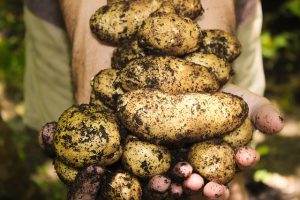
Free fourth tip: you might want to wash those potatoes.
Potato Diet Recipes
Looking for some potato hack recipes? We’ve compiled several potato diet recipes you can use with little adjustment.
Note that for these potato hack recipes, it’s important to choose the right potato for what you are making. We even have a couple of sweet potato diet recipes!
The Baked Potato—From Low Fat Vegan Chef
This oil-free baked potato recipe is potato hack friendly! They recommend russet potatoes, which is the classic baking potato.
The Boiled Potato—From Better Homes and Gardens
This guide to boiling potatoes provides advice on selecting and preparing your potatoes for boiling.
Oven Baked Fries—From This Rawsome Vegan Life
These oil-free oven-baked fries are baked on parchment paper. They are seasoned with garlic powder, black pepper, and lemon juice, but you can adjust to best fit your own potato hack.
Dairy-Free Mashed Potatoes—From Forks Over Knives
This potato-hack-friendly mashed potato recipe uses the starchy cooking water from boiling the potatoes to moisten the mash.
Baked Potato Pancakes/Latkes—From Plants Rule
This recipe for oven-baked potato pancakes recommends using potato starch as a binding agent for the latkes—perfect for an all-potato diet!
Oil-Free Hash Browns—From Straight Up Food
With a nonstick pan, oil-free hash browns are a breeze! This recipe calls for powdered onion or garlic, but you can season as you please (or not, if your potato hack is seasonings-free).
Potato Wedges—From SF Gate
This recipe has you adhere spices with citrus or vinegar to avoid using oil, so you may need to skip it if you’re totally seasonings-free on your potato hack. Otherwise, it’s a great potato diet recipe!
Healthy Sweet Potato Fries—From the Road Not Processed
This sweet potato fries recipe finishes cooking the fries under the broiler to get some caramelization. The author suggests some seasonings, but these are not necessary.
Sweet Potato Latkes—From Skinny Taste
These latkes use eggs as a binding agent and a small amount of oil, so this is only appropriate for a more flexible potato hack. However, you could also try substituting sweet potatoes in any of the above potato recipes (including the latke recipe) and see how it goes.
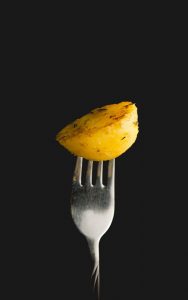
Mmm, a conservatively spiced potato!
The Bottom Line on Potato Diets
During a potato diet or potato hack, you consume primarily potatoes for some designated length of time (with some variation in seasonings, potato varieties, and cooking methods). Some people do longer potato diets for major weight loss, while others do short term potato hacks for a few days to help maintain a particular weight or lose a few pounds before an event.
Does the potato diet work? An all-potato diet results in weight loss for two major reasons:
- Potatoes keep you full for longer, so you eat less
- You get bored of potatoes, so you eat less
But is it healthy? A short term potato hack may have the following benefits:
- Potatoes are actually pretty healthy.
- Because you’re eating potatoes, you aren’t eating all the other fats and sugars you would normally eat.
- The monotony of a potato diet may help you change your relationship to food—you will get a better sense of when you are full, and when you are eating because you are bored.
However, a long-term potato diet is unhealthy for the following reasons:
- Over time, you’ll develop major nutrient deficits.
- With a lack of protein, you’ll have muscle wasting, which will slow down your metabolism.
- Mono diets can actually contribute to an unhealthy relationship with food instead of addressing it.
The truth is that most diets don’t work in the long run. For a diet to really be effective, you need to make manageably and sustainable changes. So while a short-term potato hack is potentially a useful tool to kick-start some dietary habit changes or to lose some weight fast for an event, a long-term potato diet is too restrictive to work for most people.
If you do decide to potato hack, here are some tips to help with your potato diet plan:
- Choose a good time to potato hack when it won’t be too difficult to stay on track.
- Buy enough potatoes at the start of the hack to last you through the hack (3-5 lbs/day)
- Cook some potatoes in advance of starting the hack.
- Plan when you’ll need potato snacks and meals (like work lunches) in advance.
Finally, we provided some potato hack recipes to help you prepare for a potato hack. Happy hacking!
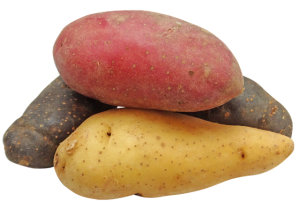
Potatoes, potatoes everywhere.
What's Next?
Thinking about the potato diet because you're worried about your heart health? See our guide to understanding your blood pressure, learn what side of your body your heart is on, and figure out what you should do if you're feeling pain under your left breast.
Curious about what other household ingredients can do for you? We can tell you about all the benefits of black seed oil and let you know how coconut oil can make your hair beautiful.
These recommendations are based solely on our knowledge and experience. If you purchase an item through one of our links, we may receive a commission.










